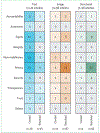Generative artificial intelligence and ethical considerations in health care: a scoping review and ethics checklist
- PMID: 39294061
- PMCID: PMC11542614
- DOI: 10.1016/S2589-7500(24)00143-2
Generative artificial intelligence and ethical considerations in health care: a scoping review and ethics checklist
Erratum in
-
Correction to Lancet Digit Health 2024; published online Sept 17. https://doi.org/10.1016/S2589-7500(24)00143-2.Lancet Digit Health. 2024 Nov;6(11):e777. doi: 10.1016/S2589-7500(24)00220-6. Epub 2024 Oct 9. Lancet Digit Health. 2024. PMID: 39384452 Free PMC article. No abstract available.
Abstract
The widespread use of Chat Generative Pre-trained Transformer (known as ChatGPT) and other emerging technology that is powered by generative artificial intelligence (GenAI) has drawn attention to the potential ethical issues they can cause, especially in high-stakes applications such as health care, but ethical discussions have not yet been translated into operationalisable solutions. Furthermore, ongoing ethical discussions often neglect other types of GenAI that have been used to synthesise data (eg, images) for research and practical purposes, which resolve some ethical issues and expose others. We did a scoping review of the ethical discussions on GenAI in health care to comprehensively analyse gaps in the research. To reduce the gaps, we have developed a checklist for comprehensive assessment and evaluation of ethical discussions in GenAI research. The checklist can be integrated into peer review and publication systems to enhance GenAI research and might be useful for ethics-related disclosures for GenAI-powered products and health-care applications of such products and beyond.
Copyright © 2024 The Author(s). Published by Elsevier Ltd. This is an Open Access article under the CC BY 4.0 license. Published by Elsevier Ltd.. All rights reserved.
Conflict of interest statement
Declaration of interests NL reports funding from the Duke–NUS Signature Research Programme funded by the Ministry of Health, Singapore. JS reports funding from the Wellcome Trust and roles as a Bioethics Committee consultant for Bayer and as an advisory panel member for the Hevolution Foundation. DSWT reports funding from National Medical Research Council, Singapore, Duke–NUS Medical School, and Agency for Science, Technology, and Research; patents on deep learning systems for diabetic retinopathy, glaucoma, and age-related macular degeneration (co-inventor; 2017), a computer-implemented method for training an image classifier using weakly annotated training data (2019), and automatically extracting measurements from an image of a display of a measurement device (2020); has a leadership role (unpaid) as Chair of the AI and Digital Innovation Standing Committee and the Asia–Pacific Academy of Ophthalmology; and serves on the executive committees of the American Academy of Ophthalmology AI Committee, STARD-AI Steering Committee, Imperial College London, DECIDE-AI, and QUANDAS-AI. EJT reports funding from the National Institutes of Health (NIH) Grant and consulting fees as an adviser to Tempus Labs, Pheno.AI, and Abridge. All other authors declare no competing interests.
Figures


References
-
- OpenAI. DALL·E 2. 2022. https://openai.com/dall-e-2 (accessed Oct 2, 2023).
-
- OpenAI. Sora 2024. https://openai.com/sora (accessed April 20, 2024).
-
- Blease C, Worthen A, Torous J. Psychiatrists’ experiences and opinions of generative artificial intelligence in mental healthcare: an online mixed methods survey. Psychiatry Res 2024; 333: 115724. - PubMed
-
- Niszczota P, Rybicka I. The credibility of dietary advice formulated by ChatGPT: robo-diets for people with food allergies. Nutrition 2023; 112: 112076. - PubMed
Publication types
MeSH terms
Grants and funding
LinkOut - more resources
Full Text Sources
Medical

